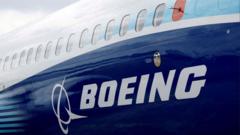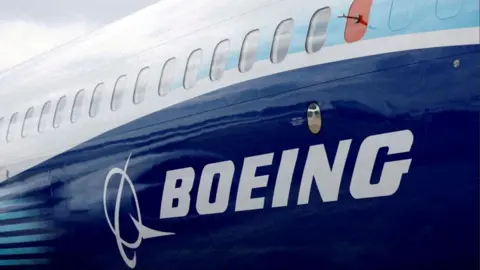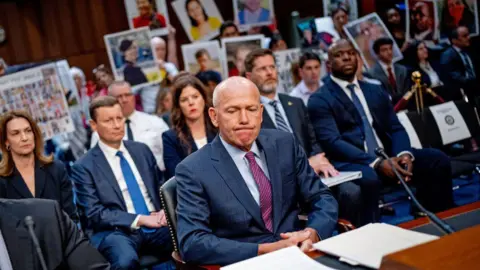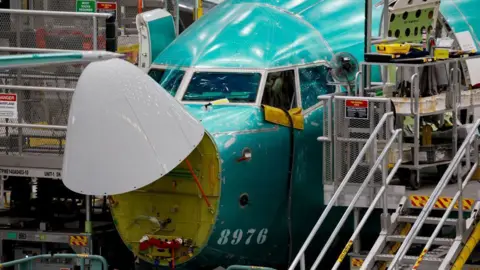This website uses cookies so that we can provide you with the best user experience possible. Cookie information is stored in your browser and performs functions such as recognising you when you return to our website and helping our team to understand which sections of the website you find most interesting and useful.

3 hours ago
By Natalie Sherman and Theo Leggett, BBC News
 Reuters
ReutersBoeing is one of the largest and most important companies in the United States. Arguably, it is too big to fail. But is it also too big to be held to account?
The company is one of the world’s two main manufacturers of large commercial jets. It ranks among the top five US defence contractors.
It employs more than 170,000 people globally, including 150,000 in the US, and generated revenues of nearly $78bn (£60bn) last year. It makes a vital contribution to the US economy.
But its commitment to safety has repeatedly been called into question, most recently following an incident earlier this year in which a disused door fell off a Boeing 737 Max minutes after takeoff.
Whistleblowers have since made a series of claims about alleged unsafe practices in Boeing’s factories, as well as in those of its main supplier, Spirit Aerosystems.
Government prosecutors have now given their response. Boeing has agreed a deal under which it will plead guilty to an existing criminal charge, pay $243.6m and submit to independent monitoring for three years.
With critics calling for a fundamental change in Boeing’s corporate culture, the deal is likely to be highly controversial.
That is largely because safety failings at the company are far from new – while attempts to address them appear to have been unsuccessful.
Five years ago, Boeing was under siege: 346 people had been killed in two near-identical accidents involving its brand new 737 Max, just months apart.
It emerged that corners had been cut during the aircraft’s design, and regulators had been deceived. After the first crash, the aircraft had been allowed to keep flying despite a known problem.
Boeing was accused of putting profits ahead of passenger safety. In 2021, it agreed to pay a $2.5bn settlement, but avoided prosecution on a criminal fraud conspiracy charge.
The Department of Justice (DoJ) has now concluded that Boeing broke the terms of that settlement – by not implementing and enforcing a suitable compliance and ethics programme – allowing the company to be prosecuted now under the original criminal charge.
 Getty Images
Getty ImagesBut family members of many of those killed think the new deal is far too lenient. They had been calling for a much steeper penalty.
In a letter sent to prosecutors last month, their lawyer Paul Cassell called for a fine of more than $24bn in recognition of what he described as “the deadliest corporate crime in US history”.
He also called for individuals to face prosecution, including the former chief executive, Dennis Muilenberg.
Lawmakers in Washington have also expressed concerns that Boeing is too important to be held fully accountable.
At a hearing in April, Republican Senator Ron Johnson said he feared regulators were concerned about hurting a company so critical to the US economy.
"I’ll go back to the reality of the fact that we all want Boeing to succeed,” he said.
“We don’t want to think that there are conditions in these planes that should really force regulators to ground these planes - what that would do to our economy, what that would do to people’s lives.
“I think that’s what’s driving the lack of accountability,” he added.
Analysts said there was little doubt Boeing’s status as a major contractor to the US military would have been a key factor in deciding what action to take against the company.
In 2022 alone, it racked up more than $14bn worth of contracts with the Department of Defense.
"That may matter the most regarding not the direct terms of the plea, but rather the negotiations over possible debarment or suspension from contracting," said Prof Brandon Garrett of Duke University School of Law, who tracks corporate prosecutions.
 Getty Images
Getty ImagesThere is also Boeing’s position in the commercial aviation market to consider. The aerospace giant currently has orders for more than 6,000 jets, representing years of production. Its great rival Airbus has an even larger backlog, and has been struggling to produce enough planes to meet demand.
Put simply, the market currently needs Boeing if airlines are to obtain the planes they need. But in the future the company will also have to be in good shape if it is to see off the threat from an emerging rival.
Chinese state-backed manufacturer Comac is now producing the C919 passenger jet, a potential rival to the 737 Max and Airbus A320 neo. It began commercial flights in May.
Although its order book is tiny compared to those of the two established giants, in the longer term it could profit from any weakness at the American giant.
There is also potential for Brazil’s Embraer, a successful manufacturer of smaller regional airlines, to move into the space occupied by Boeing and Airbus.
"Boeing's too big to fail, but it's not too big to be mediocre," says Ronald Epstein, managing director at Bank of America, who follows the firm.
"We all want a healthy Boeing," he adds. "Having a Boeing that's on the wrong track is bad for everybody."
The crises have already taken a heavy toll on the company, which has lost money every year since 2019, a sum totalling more than $30bn.
All of this may explain why the DoJ has not imposed steeper penalties on Boeing. Nevertheless, the company has admitted to a serious crime.
That in itself is a major development. The question now is whether the DoJ has done enough to deter future wrongdoing.



 Africana55 Radio
Africana55 Radio 

